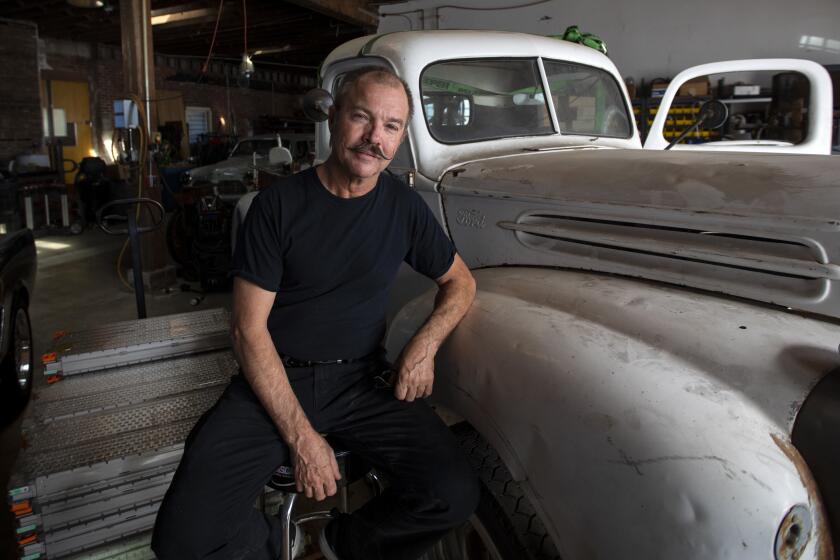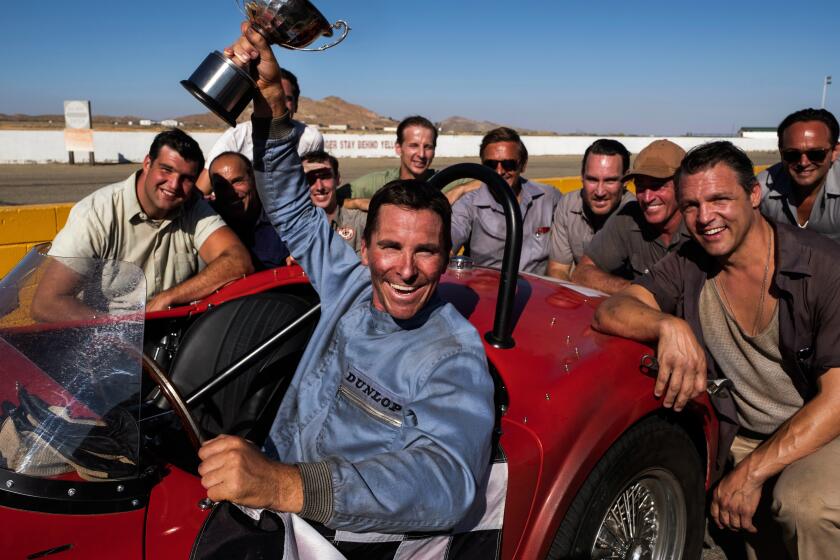Steve McQueen’s Bullitt Mustang sells for $3.4 million
- Share via
The Bullitt Mustang has sold for $3.4 million — $3.74 million including buyers fees — at a Mecum Auction in Kissimmee, Fla. The hammer price was the most money ever spent on a Mustang at public auction, beating the previous record of $2.2 million for the 1967 Shelby GT500 Super Snake set at Mecum’s Kissimmee auction in 2019.
Wearing a large black cowboy hat and standing on the auction podium in front of a standing-room-only crowd, Mecum auctioneer Matt Moravec started the bidding on the Highland Green fastback at $3,500, but the price jumped to $1 million almost instantly and then jumped to $2 million within a minute.
The unusually low starting price for such a well-known car was requested by the car’s owner, Sean Kiernan, who told the auction room before the bidding started that both times the car had sold previously, it was purchased for $3,500. (Robert Kiernan, Sean’s late father, purchased the car for $3,500, as did a previous owner, Frank Marranca.)
A growing army of hot rodders is cannibalizing crashed electric cars and turning them into custom vehicles with electric power trains.
The auction was not your typical sale in an additional way: The unrestored Mustang was offered at no reserve. Typically, cars of million-dollar caliber are offered with a minimum amount required to sell — if no buyers meet that amount, owners can retain their ownership. But Kiernan said he wanted to ensure that the car would sell the first time around, because he couldn’t face the prospect of repeating the heavy emotions of selling — or not selling — his late father’s prized possession.
The car is famous as the hero of one of Hollywood’s most celebrated chase scenes, in which Steve McQueen raced it through the streets of San Francisco in the 1968 thriller “Bullitt.” The interior includes remnants of filming equipment still on the body of the car. A coupe with a blacked-out grille and paint worn to a rough patina, its engine was modified to enhance speed and sound with additional camera mounts welded to the metal tubes underneath its body. Film hands cut into the trunk to allow cords to run from the generator to the cameras and lights.
Take the U.S. population. Concentrate on the 49% who are male.
(There were actually two Mustangs used in the film. In 2017, a Paramount-based body shop owner said he found the other vehicle in a scrapyard in Baja California.)
After filming was completed, a Warner Bros. employee used the car as a daily driver. Marranca, a New Jersey detective, bought it in 1970. In 1974, he placed an ad in Road & Track magazine, as detailed here, that read, “1968 ‘Bullett’ [sic] MUSTANG driven by McQueen in the movie …Can be documented. Best offer.” Kiernan bought the car that year and kept it until his death in 2014, when his son became the owner.
The Bullitt car is one of many McQueen machines to draw a big price with the help of his celebrity star dust. McQueen-associated vehicles have a history of fetching more than market rate: In 2014, a McQueen-owned 1967 Ferrari 275 GTB by Scaglietti sold for $10.18 million. In 2015, his 1976 Porsche 930 Turbo sold for $1.95 million—an astounding figure, considering that Porsche Turbos from that era usually sell for closer to $200,000.
When director James Mangold’s new movie “Ford v Ferrari” hits theaters Nov. 15, car nuts may find themselves asking where the filmmakers found all those classic Carroll Shelby race cars from the 1960s, which sell for millions of dollars when they become available.
The Bullitt is also now the most expensive American muscle car sold at public auction, though the record for most expensive American car ever auctioned — a 1935 Duesenberg SSJ that sold for $22 million in 2018 by Gooding and Co. — remains unscathed.
“The Bullitt Mustang has it all: a great chase scene, the McQueen connection, and a fantastic backstory,” said McKeel Hagerty, chief executive of Hagerty. “The fact that it had disappeared for decades, only to reemerge as an unrestored, movie-car time capsule is something we’ll likely never see again in our lifetimes.”
At the time of the sale, it was unclear who had purchased the vehicle; a representative for Mecum could not be reached before publication of this story.
More to Read
Inside the business of entertainment
The Wide Shot brings you news, analysis and insights on everything from streaming wars to production — and what it all means for the future.
You may occasionally receive promotional content from the Los Angeles Times.











